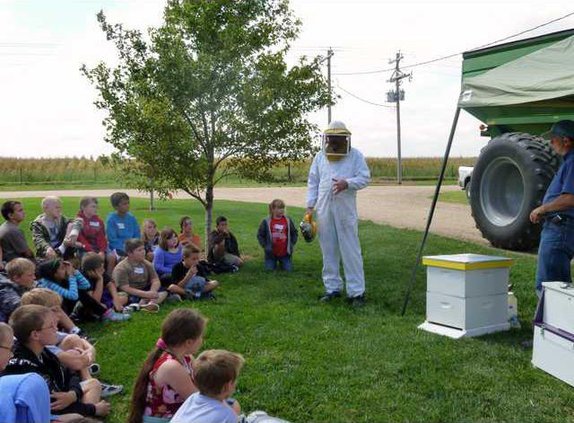Barton County fourth graders got a crash course in farming Wednesday, during the 17th Kids Ag Day.
Nearly 400 children rode behind tractors on flatbed trailers stacked with bales of straw, as they traveled to seven educational stops on Ron and Deb Koelsch’s Diamond K Farm. Along the way, they took in the sights, sounds and smells of a working farm as they heard speakers talk about growing crops, wise use of chemicals, farm equipment, irrigation, raising animals and protecting natural resources.
"This feels weird!" said student Yamalie Olivas from Riley Elementary in Great Bend, as the wagon bumped across the ground. She and classmate Jessica Espino agreed there were some fun things, too — like getting to hold bunnies at the petting zoo.
Jerry Esfeld, a former teacher who is now with Farm Bureau and the Great Bend Chamber of Commerce ag committee, which sponsors Kids Ag Day, recognized a teachable moment Wednesday when she saw some girls holding baby chicks. "Without these, we wouldn’t have KFC," she told the girls, who shot her a puzzled look. "Fried chicken comes from a chicken; that’s where we get the meat," she explained.
This is the same message Kids Ag Day sponsors have pushed for 17 years, but it’s new to each batch of fourth graders who attend. As fewer and fewer children grow up on farms, or visiting grandparents who live on farms, kids need to be taught what agriculture is and the importance of agriculture in the world, Esfeld said.
For fourth graders in Great Bend USD 428, the science curriculum for the first nine weeks of school focuses on agriculture, she said. "A follow-up to Ag Day will be that all fourth graders are invited to attend the Kansas State Fair, and Farm Bureau pays their ticket." In addition to USD 428 students, Farm Bureau also supplied Ellinwood FFA with 50 state fair tickets, she said.
At one of the first stops on the hayride, farmer/agronomist Michael Bahr and Jeff Mauler from the Great Bend Co-op talked about some of Barton County’s biggest crops and what they’re used for.
"When you reach for a snack after school, look on the side of the box or the side of the bag at the ingredients," Mauler said. Wheat, corn or soybeans show up in a variety of packaged foods, and in some non-food products as well. Cornstarch is in disposable diapers, and milo is used to make wallboard.
Kids learned that soybeans first came to the United States from China in 1903, milo originated in Africa and wheat came from Russia. Corn is a native product of Mexico, and sunflowers are the Kansas state flower and a source of oil and food.
Dale Unruh, a farmer, with Doug Barrett from Straub International, had a display of toys that showed how farm equipment has evolved from horse-drawn plows and threshing machines in the 1890s to tractors and combines in the 1930s, then to bigger, cabbed tractors in the 1980s, and now to even bigger tractors — some guided by GPS technology.
Tony Martinez from Tony’s Aerial Spraying, joined by Robert Seifkes from Great Bend Co-op, explained how plants need water, sun and food to grow, which is why the wise use of fertilizer is important. Later, Charles Atkinson from the USDA Conservation Service in Barton County and agronomist Aaron Wolf would talk about how irrigation has evolved.
There was even a little math thrown in. Students learned that land is measured in acres, and 1 acre is about the size of a football field. An acre-inch of water is enough water to cover an acre with an inch of water, or about 27,000 gallons. Barton County has about 550,000 acres of cropland.
Veterinarian Bill Niederee and banker-stockman Shane Dicks talked about raising animals, with Dan Frieb and Robert Roth from USDA Conservation Service had a lesson on protecting natural resources.
There were also some fun demonstrations, often involving more farm animals. Students met a cowboy and a couple of beekeepers.
Volunteers from the Great Bend Chamber of Commerce ag committee and FFA members from county high schools helped keep things running smoothly. Kids had plenty of water during the day, lunch, and a healthy snack break with Donna Krug and Berny Unruh from the Barton County KSU Extension Office.





